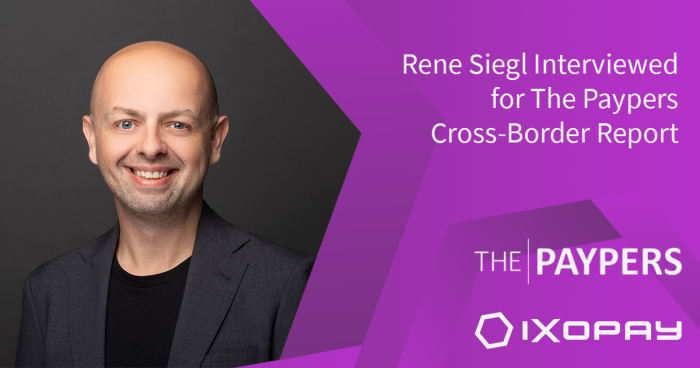What should merchants that wish to enter new markets know about working with multiple PSPs and acquirers?
When a merchant is contemplating entering a new market, one of the first things they should do is look at their current payment strategy. Before they start working with new PSPs and acquirers, it is essential for merchants to take note of what is currently working, what could be improved, and what needs to change. A lot of merchants think that simply building a connection to a new PSP and acquirer is sufficient. However, I cannot stress enough the importance of a rock solid foundation – if it does not exist, you will struggle to get the returns you want. Therefore, expanding in new markets without a solid payment strategy might get the job done, but you will suffer in the long run.
By adding a supplementary layer of payment orchestration, the merchant only has one connection – which will then allow them to associate with as many payment service providers and acquirers as they see fit; it also means that all customer payment details are stored in a third-party secure vault, so that merchants will have access to this information regardless of who is processing their payments. This flexibility allows merchants to add PSPs and APMs on the fly, leaving room for negotiating better rates.
Another crucial factor is that different countries use different payment methods – in fact, it is not just countries, it is different generations as well. Therefore, it is well worth the effort of doing a little research to see how your target market pays.
Can you elaborate on the importance of smart transaction routing? Why is it particularly important for international players?
What people sometimes neglect to think about is that payments represent an important part of the user experience. If a transaction gets sent to a PSP that deems it too risky, because of the location or the payment method, the payment will not be accepted. This can happen frequently when operating internationally; a way to limit this is to set up routing rules. With IXOPAY you can use various criteria to control the routing decisions: card data; customer data; geographic parameters; risk classification, depending on whether it is a ‘low-risk’ or ‘high-risk’ brand; as well as any number of platform and application-specific data. It is also possible to balance the number of transactions that get sent to certain PSPs, and this can be done during periods of high traffic – or generally, so you don’t exceed any limits you may have. By routing your payments, you will keep your decline rates as low as possible and improve your user experience.
“"Expanding in new markets without a solid payment strategy might get the job done, but you will suffer in the long run."”
What are the main obstacles global merchants should pay attention to?
A big issue for those who are selling on a large scale and across different markets is fraud – in fact, the larger you are, the more likely it is for people to try to commit fraud. Fraudulent transactions, chargebacks, refunds, and so forth are costly and time-consuming. With IXOPAY you can increase your risk checks, being able to identify suspicious transactions in real-time and mitigate payment risks and fraud. In addition to the basic checks, merchants can create their own ‘risk rules’ with user-defined parameters (e.g. the time of the completed transaction, the country in which the transaction takes place, the transaction amount, the payment method etc.). These transaction checks can be approved either automatically or manually.
Merchants also have problems with the consolidation of payment data. With individual connections, you receive reports in various formats and sometimes containing different information – making it difficult to effectively analyze them. IXOPAY saves time by collating all of your payment data. You can view it however you see fit – you can either see the whole picture or narrow it down to one payment provider in one location. It can also be exported into your BI software. What needs to be remembered is that payments aren’t just about getting the money, they represent a complicated process – and when you have data that you can analyze and compare, you can see what is and what is not working and make efforts to improve it.
Something that also needs to be considered is time to market, meaning that if you want to add a new payment provider, you have to think about how long it will take you and how much it will cost to build individual connections. When using a payment orchestration platform, these connections are ready and waiting.
During this pandemic, the industry went through some irreversible changes. How can merchants keep up with the latest developments without putting their business (and maybe international expansion plans - from a global perspective) on hold?
Whether you are a solution provider, financial institution, or retailer, everyone has been affected by the pandemic, and we have all had to adapt to the new circumstances. Retailers in the digital environment (digital goods) saw an increase in turnover, while our retail and travel customers faced unprecedented challenges. As we always say, there is no one-size-fits-all solution, but the one thing our clients had in common was the flexibility to enter new market segments faster, thanks to a payment orchestration platform.
The Interview was first published in The Paypers Cross-Border Payments and eCommerce Report 2020/2021. Download the full report.
About IXOPAY
IXOPAY is a payments orchestration platform enabling independent, flexible and global payment processing. As a highly scalable and PCI-DSS certified “fintech enabler”, IXOPAY fulfills the needs of large merchants as well as those of “white label” clients: payment service providers (PSPs), acquirers and independent sales organizations (ISOs). The modern, easily extendable architecture offers smart transaction routing & cascading, state-of-the-art risk & fraud management, fully automated reconciliation and settlements processing, comprehensive reporting as well as plugin-based integration of acquirers, payment service providers and alternative payment methods (APMs).
IXOPAY is part of the IXOLIT Group, founded in Vienna, Austria in 2001. With local entities in Austria and the USA, IXOLIT supports national and international customers across various industry verticals. The owner-led and -financed company has grown from 2 to more than 65 employees and is focused on building innovative solutions for eCommerce.
Please find more information about IXOPAY here: https://www.ixopay.com

